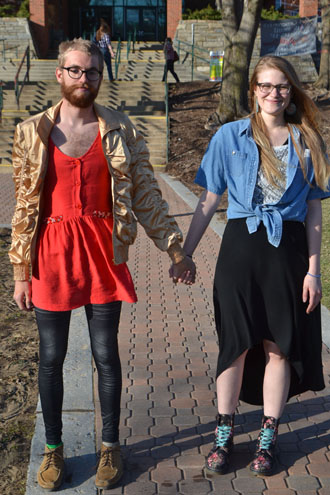
Some students across campus are not changing their clothes for the month of April to bring awareness to victims of sex trafficking as a part of One Dress, One Shirt, One Month.
Participants find sponsors to help them raise funds for the Hope House, a rescue home in Asheville for minors who have been victimized by sex trafficking.
Participants at Appalachian State University hope to raise $2,834, which is the cost to support one girl in the Hope House for one month. So far, they have raised $935.
The month-long challenge serves as a way to bring attention to the overarching issue by shifting the focus away from the individuals participating.
“A lot of people don’t realize that sex trafficking happens in the United States – they think it’s more of a foreign problem,” said Shady Kimzey, a participant in One Dress, One Month.
For Kimzey, a junior sustainable development major, the experience is humbling.
“In first world countries, we express ourselves a lot through what we wear, and we have the money and ability to consume and shop every day without repeating an outfit, if we wanted to,” Kimzey said.
For junior sustainable development major Chris Criqui, the experience has already created a big stir in his life. Criqui has chosen to wear a dress, rather than the usual male option of a T-shirt, to start conversations about the issue.
“I definitely draw a lot of stares walking around campus,” Criqui said. “I’ve had a lot of people tell me I have nice legs.”
Criqui sees the month as an opportunity to step outside of his comfort zone.
“It’s an interesting social experiment,” Criqui said.
One Dress, One Month is run through the Hundred Movement, a national campaign to end sex trafficking in the United States through local efforts in communities.
On campus, the campaign is called Break Out Walk Out, an unofficial organization that partners with other campus organizations with similar goals to involve students and the community in acting for social justice.
Organizers for the Break Out Walk Out attempt to bring light to local and global issues through awareness, action and religious involvement.
“My personal motivation is spurred from seeing firsthand how enslaved these women are and wanting to understand, on a very minor level, how trapped they must feel,” said Kate Miller, an intern with the Hundred Movement and leader of Break Out.
Miller spent time in India working with victimized women. Upon returning to the United States, she saw a gaping discrepancy with the ways sex trafficking is dealt with.
“I want to draw attention to this injustice so that others will be aware of what’s probably going on in their very own city,” Miller said.
A social justice coffee hour focused on sex trafficking will take place Wednesday, April 17 in the ACT office in Plemmons Student Union at 7 p.m. in connection with the month.
Break Out Walk Out will host a night of worship, prayer, art and final fundraising for the Hope House Friday, April 26 at the Harvest House at 7 p.m.
Story: LOVEY COOPER, Senior A&E Reporter
Photo: MARK KENNA, Intern Photographer

